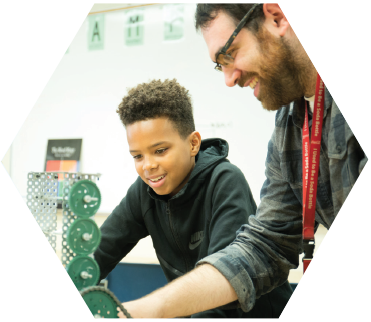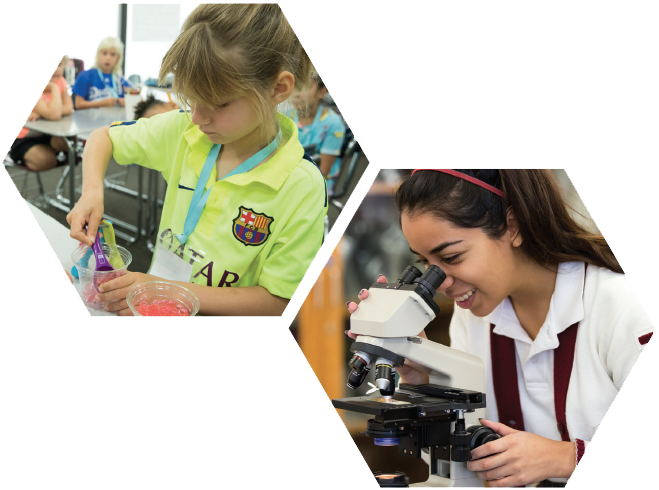“It’s important that our teachers meet students where they are, and where they are today is in a digital world,” says Shannon Tabaldo, SOE’s director of digital curriculum integration and development and founding director of the iDEAL (Innovation in Digital Education and Leadership) Institute, who brought in SOE alum Neal Manegold (MA ’03), Microsoft’s director of Minecraft education, for an interactive session with her SOE students on the game’s classroom applications. “This is pushing our teachers to think about what gamification in the classroom means and how they can make it not only fun and engaging, but applicable to real-life knowledge.”
“
Students are naturally curious. Our job is to take advantage
of the tools we have to teach critical thinking and problem
solving, and to create opportunities for students to use
those skills in ways that will prepare them to make an
impact on their community and the world.”
— Shannon Tabaldo, SOE's director of digital curriculum integration and development, and founding director of the iDEAL Institute
The Minecraft project is part of a comprehensive and wide-ranging SOE effort to
enhance science, technology, engineering and math education for all learners.
Over the summer, LMU and the nonprofit group Project Scientist hosted five
weeklong sessions immersing girls ages 4-12 in a STEM curriculum facilitated
by skilled and credentialed educators. In addition to affording the young
participants with hands-on experiments and daily interactions with female role
models, the partnership facilitated invaluable experiences for SOE staff and
students pursuing education and STEM-related studies.

SOE also continues to contribute to enhanced STEM education in K-12 settings
through the LMU Family of Schools, a collaborative dedicated to promoting
student success and educational equity in the LMU-adjacent communities of
Westchester, Playa del Rey and Playa Vista. A cornerstone of that effort, the
year-old New Middle School Pathway, was renamed the Katherine Johnson STEM
Academy by the LAUSD Board of Education in June 2018. The board adopted
the proposal — which sought input from parents, students, teachers and
community members — in honor of the famed NASA mathematician. Katherine
Johnson STEM Academy is one of nine traditional public schools in the LMU
FOS, which also includes four Catholic Archdiocesan schools and three charter
schools.

Last spring also marked the debut of a new Upward Bound Math and Science program at LMU to prepare traditionally underrepresented Westchester high school students for STEM-focused studies in college. The program, established with a $1.3 million U.S. Department of Education grant, complements the existing Upward Bound program, housed in SOE, which supports Westchester Enriched Sciences Magnets high school in promoting increased graduation, college enrollment and college graduation rates among first-generation and financially disadvantaged students. “This will allow LMU’s School of Education to double its efforts to support high school students in the community, particularly those interested in pursuing STEM-related fields in college,” says Norma Romero, director of both programs.
The year was also notable for the inaugural EdTech Mini-Conference at LMU, hosted by the SOE Alumni Association. SOE students and alumni — along with keynote speaker Chet Pipkin, founder and chairman of Belkin International, and other Los Angeles educators — gathered to discuss the impact of technology in education and to explore the innovative uses of technology through the lens of classroom teachers, education support services personnel and administrators.
Tabaldo, one of the EdTech panelists, explains that all of SOE’s STEM-related initiatives are based on the conviction that empowering K-12 students through innovative and engaging teaching approaches is essential for a better future. “Educators don’t have to hold all of the knowledge — we are there to be facilitators of exploration,” she says. “Students are naturally curious. Our job is to take advantage of the tools we have to teach critical thinking and problem solving, and to create opportunities for students to use those skills in ways that will prepare them to make an impact on their community and the world.”
Students are
naturally curious.
Our job is to take
advantage of the
tools we have
to teach critical
thinking and
problem solving,
and to create
opportunities for
students to use
those skills in ways
that will prepare
them to make an
impact on their
community and the
world.”
— Shannon Tabaldo,
SOE's director of digital curriculum integration and development, and founding director of the iDEAL Institute